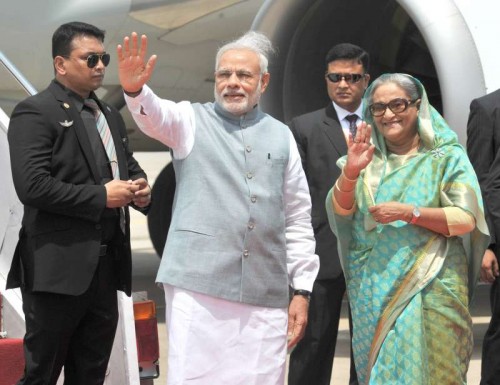
In a historic move, India and Bangladesh ratified an over 40-year-old land border swap agreement and flagged off two new trans-border buses as Prime Minister Narendra Modi held talks with his Bangladeshi counterpart Sheikh Hasina and announced a $2 billion Line of Credit to Dhaka.
Both countries also inked 22 agreements, including renewing a bilateral trade agreement, an agreement on coastal shipping, on using of the Chittagong and Mongla ports, and prevention of smuggling and circulation of fake currency notes.
Bangladesh also inked two MoUs with Adani Power Limited and Reliance Group to set up 4,600 MW power plants in the country.
The deals worth $5.5 billion were inked by Power Development Board of Bangladesh and the Indian companies at the Bidyut Bhaban in Dhaka.
Adani Power is to invest $2.5 billion to set up a coal-based power plant with capacity of 1,600 MW while Reliance Group is to set up an imported Liquefied Natural Gas-based power plant with 3,000 MW capacity at a cost of $3 billion.
The sites for setting up the plants are yet to be decided.
Earlier, Modi along with Hasina and West Bengal Chief Minister Mamata Banerjee flagged off the Kolkata-Dhaka-Agartala and Dhaka-Shillong-Guwahati bus services.
Modi, who arrived in the morning on a two-day visit, said his Dhaka visit “is at a historic moment”.
“We have resolved a question that has lingered since Independence. Our two nations have a settled boundary. It will make our borders more secure and people’s life there more stable.”
He said the Indian parliament’s approval of the Land Boundary Agreement “reflects the consensus in India on relations with Bangladesh”.
The formal LBA ratificaiton ceremony was witnessed by Modi, Hasina and Banerjee.
The exchange of documents was done by Indian Foreign Secretary S. Jaishankar and his Bangladeshi counterpart M. Shahidul Haque.
The land swap agreement envisages transfer of 111 enclaves with a total area of 17,160.63 acres to Bangladesh, while Dhaka is to transfer 51 enclaves with an area of 7,110.02 acres to India. A 6.1-km undefined border stretch will be demarcated.
The Indian parliament last month unanimously passed the constitution amendment bill to allow operationalisation of the 1974 India-Bangladesh deal and its protocol inked in 2011.
Modi expressed confidence that “with the support of state governments in India, we can reach a fair solution on Teesta and Feni rivers”.
The Teesta river deal is the other outstanding issue that Bangladesh is keen to see India agree to.
Modi, announcing the $2 billion line of credit to support infrastructure and other development activities in Bangladesh, said the three agreements on human trafficking, fake Indian currency and maritime safety were a reflection of their growing security cooperation.
Modi said he was conscious of the huge trade imbalance with Bangladesh and that he has assured Hasina that India will do everything to bridge the deficit.
Modi said the two bus services flagged off would connect citizens of the two countries more easily and “our two nations more closely”.
He said power supply from India to Bangladesh would grow from 500 MW to 1,100 MW within two years, and added that the 1,320 MW Rampal power project was making progress.
Stressing on connectivity, Modi said Bangladesh’s decision to allow transit of power equipment and foodgrain to the Northeast “echoes the strength of your human values and our shared economic opportunities”.
Speaking of the sub-regional connectivity, Modi said “we will deepen regional connectivity and cooperation between Bangladesh, Bhutan, India and Nepal. There is a natural logic to this arrangement”.
Hasina in her statement termed Modi’s visit a “historic moment for Bangladesh” and that it would take bilateral ties on a higher trajectory.
She said ratification of the LBA would resolve the problems of the people living in the enclaves for decades.
“We are very grateful,” she said.
She praised the leadership of Modi and said the LBA became possible under his leadership. She also expressed thanks on behalf of the people of Bangladesh.
Hasina said Modi’s visit has instilled new dynamism confidence in the bilateral relationship.
Earlier, Modi visited the Bangabandhu Memorial Museum to pay tribute to the founder of Bangladesh, Sheikh Mujibur Rahman. He also went to the National Martyrs’ Memorial, or the Jatiyo Sriti Shoudho, to pay tribute to the soldiers who gave their lives in the Bangladesh Liberation War of 1971.
Modi was received by Hasina in a special gesture after he landed at the Hazrat Shahjalal International Airport in a special Indian Air Force (IAF) aircraft, Rajdoot.
Modi on Saturday said his two-day “historic” visit to Bangladesh will “strengthen ties” between the two countries.
In a tweet, Modi thanked Sheikh Hasina for the warm welcome.
In the evening, Modi attended a special dinner banquet hosted by Hasina and was treated to a vegetarian cuisine and a cultural programme.